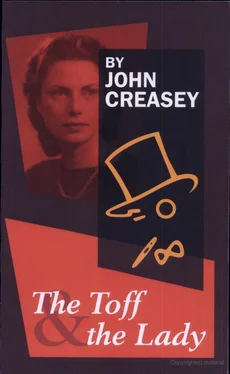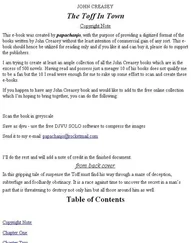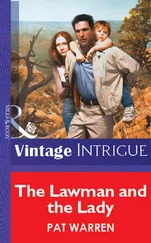John Creasey - The Toff and The Lady
Здесь есть возможность читать онлайн «John Creasey - The Toff and The Lady» весь текст электронной книги совершенно бесплатно (целиком полную версию без сокращений). В некоторых случаях можно слушать аудио, скачать через торрент в формате fb2 и присутствует краткое содержание. Жанр: Старинная литература, на русском языке. Описание произведения, (предисловие) а так же отзывы посетителей доступны на портале библиотеки ЛибКат.
- Название:The Toff and The Lady
- Автор:
- Жанр:
- Год:неизвестен
- ISBN:нет данных
- Рейтинг книги:5 / 5. Голосов: 1
-
Избранное:Добавить в избранное
- Отзывы:
-
Ваша оценка:
- 100
- 1
- 2
- 3
- 4
- 5
The Toff and The Lady: краткое содержание, описание и аннотация
Предлагаем к чтению аннотацию, описание, краткое содержание или предисловие (зависит от того, что написал сам автор книги «The Toff and The Lady»). Если вы не нашли необходимую информацию о книге — напишите в комментариях, мы постараемся отыскать её.
The Toff and The Lady — читать онлайн бесплатно полную книгу (весь текст) целиком
Ниже представлен текст книги, разбитый по страницам. Система сохранения места последней прочитанной страницы, позволяет с удобством читать онлайн бесплатно книгу «The Toff and The Lady», без необходимости каждый раз заново искать на чём Вы остановились. Поставьте закладку, и сможете в любой момент перейти на страницу, на которой закончили чтение.
Интервал:
Закладка:
Rollison said: “Hilda, my sweet, Gwendoline was within a few inches of losing her life.” He picked the knife up from the piano, and Hilda gasped. “Dr. Renfrew knows he must tell the police. If you persuade him not to, it will only make things awkward for him, because I am going to see the police very soon.”
“Rolly!”
“And,” continued Rollison, “I am going to tell them that David is missing.”
“You are not!” cried Pomeroy.
It was the first time he had taken part in the conversation, and he made Renfrew start. The doctor’s dark, sleek hair and rather aquiline face gave him quite a presence, but the way he looked then made him seem very young. He was nearly as tall as Rollison, and he dwarfed Pomeroy, who came strutting forward and put a hand on Hilda’s arm.
“Aren’t we?” murmered Rollison.
“If you consider it your duty to inform the police of this dastardly attack on Gwendoline, then I am in full agreement,” said Pomeroy, “but to acquaint them of the fact that David is missing will be to heap coals upon the fire of rumour now sweeping through the City. Such an action would be a betrayal of friendship, would perhaps do incalculable harm to a great and good man. I have no doubt that there are excellent reasons for David’s protracted absence, and I insist that no such report is made to the police.”
He eyed Rollison, not with anger but with indignation, and his grip on Hilda’s arm tightened. It was easy to see how simple it had been for him to influence the others earlier.
“Mr. Pomeroy, I do not like your advice,” Rollison said mildly.
“Like it or not, as you wish, sir, but it is advice which takes into consideration the reputation of a very fine character and, if that were not enough, it affects the happiness and the domestic joy of a woman whom I admire and esteem so much that I will exert myself in every way, to the very limit of my endurance, to prevent you from committing this cardinal tactical error. I do not know you, sir. I believe that we have some cause to be grateful for your prompt action, when Gwendoline was injured, but I do not see that as justification for such an attitude as you are now adopting. Have you no loyalty towards Hilda?”
“So much that I am advising her for her own good.” He looked at Renfrew. “What do you think?”
“I had no idea that Mr. Barrington-Ley was missing,” said Renfrew, worriedly, “but if no one knows where he is, then it would be wise to tell the police.”
“That is intolerable presumption, Doctor,” said Pomeroy coldly. “I forfeit this story to be placed before the police, to allow it to be handed out to the Press, that it may be blazoned across the headlines of the daily newspapers in the morning, to let it create a panic selling on the Stock Exchange, to undermine the good name and the security of the many companies in which my dear friend David has an interest. Understand, sir—I forbid it!”
Rollison let him finish, then stepped towards Hilda, removed Pomeroy’s hand, drew Hilda towards him, and said:
“Hilda, they tried to kill Gwendoline. They have probably kidnapped David. He is, at this moment, in acute danger. I can’t help to save him unless the police know. Do you understand me—David is in acute danger.”
“I declare” began Pomeroy.
“Be quiet!” snapped Rollison.
The man opened his mouth and closed it again, and then backed away. Hilda stared aghast, into Rollison’s eyes, and then went slowly across the room towards the telephone. She picked up the receiver.
“What is the number?” she asked.
“Whitehall 1212,” said Rollison.
He watched Pomeroy closely. The man was angry and disappointed, and Rollison thought that he was afraid, but he preserved a dignified silence. Rollison went to Hilda’s side, told her to ask for Grice and, when she had spoken to the Superintendent, gave him a summary of what had happened, to make sure that Hilda and the others knew that it would be useless to go back on their word. He rang off, and said:
“The police will be here within twenty minutes. Sit down and rest, Hilda. Gwendoline is all right, isn’t she?”
“She will be,” said Renfrew. “It isn’t serious.”
“Good!” said Rollison, leading Hilda to a chair. “Can you stay here until the police arrive, Renfrew?”
“I intend to do so,” said Renfrew.
“Then I needn’t stay,” said Rollison. “Will you see that the knife is left, untouched, on the piano?”
He went out, opening the front door himself. The footman who had shown such veiled insolence and who had affected to be stupefied instead of stopping the little man with the knife, was nowhere to be seen. As Rollison sauntered along the road, the chimes of a nearby clock struck midnight. He frowned at the lateness of the hour, but he did not go far, walking back towards Barrington House on the opposite side of the road. There was a street lamp near the front gate, and he expected to see Pomeroy come out.
When Grice arrived, the clock was striking the quarter, Rollison walked away; Pomeroy had either used a side entrance or was still inside the house.
Jolly was standing by the radiogram in a corner of the big room at the flat, and Lady Lost was leaning back in an easy chair with her eyes closed and a faint smile at her lips. Rollison entered the room, and Jolly bowed slightly and motioned to the radiogram. Rollison nodded. When the last record was played, a bright and lively waltz by Johann Strauss, Jolly stopped the disc and inquired:
“Is there anything you require, sir?”
“Let’s have some coffee,” said Rollison.
“Very good, sir.” Jolly went out and Rollison stood looking at Lady Lost. She had opened her eyes and was looking at him. The smile had died, and something of the hurt she had suffered at Barrington House showed on her face; it was as if she were keeping her eyes half-closed to prevent him from seeing the hurt in them.
He could not understand the turmoil in his mind.
This woman might be a fraud; Gwendoline might be right; but he desired above all else to prove that Lady Lost was innocent of all chicanery; he wanted to believe her memory gone, and longed to restore it.
At last she broke the silence.
“Please do not talk of what happened. It is—forgotten.”
“Is it?” asked Rollison, slowly.
“Yes, and it does not matter. The girl dislikes me. Once she came to see me at the hospital, and then it was clear—she dislikes and distrusts me, and who can be blamed for talking as she did of a person whom one does not trust?”
“There’s something in that,” said Rollison. He offered cigarettes, but she refused. He lit one, slowly. “She says that you know her father, and that you saw him several times before you appeared at Barrington House.”
The woman sat up, her eyes ablaze.
“Then where is he? Where is he? If he saw me then he can name me!”
“He has gone away,” said Rollison, gently.
“To where? How long must I wait?”
“No one knows where,” said Rollison.
She looked acutely disappointed; he could not bring himself to believe it was feigned. She stared at him with her eyes wide open and her lips parted.
“Has he—been hurt?” she asked.
“I don’t know,” said Rollison.
“You would tell me if that were so,” she said.
“Yes. Listen to me. Bar-ring-ton-Ley. ” He uttered each syllable carefully. “Had you heard it before you went to their home?”
“I do not know,” she said. “I just do not know.”
He smiled.
“I shouldn’t have worried you with that, just now.”
Jolly came in with the coffee and some biscuits.
“Pour out, Jolly, please,” said Rollison, and stepped towards the radiogram. Four records were spread out on top—the National Anthems of Yugo-Slavia, Greece, Rumania and Bulgaria. The coffee in that tiny pot was of a kind popular in the Balkans and the Middle East.
Читать дальшеИнтервал:
Закладка:
Похожие книги на «The Toff and The Lady»
Представляем Вашему вниманию похожие книги на «The Toff and The Lady» списком для выбора. Мы отобрали схожую по названию и смыслу литературу в надежде предоставить читателям больше вариантов отыскать новые, интересные, ещё непрочитанные произведения.
Обсуждение, отзывы о книге «The Toff and The Lady» и просто собственные мнения читателей. Оставьте ваши комментарии, напишите, что Вы думаете о произведении, его смысле или главных героях. Укажите что конкретно понравилось, а что нет, и почему Вы так считаете.












